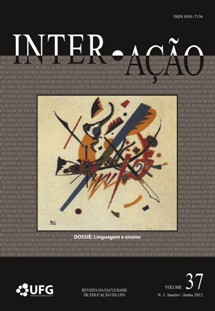SENSO COMUM E ESTEREOTIPIA NAS PRÁTICAS DE LEITURA
DOI:
https://doi.org/10.5216/ia.v37i1.18866Resumo
Este artigo apresenta uma reflexão sobre as representações sociais acerca da leitura e de sua prática sob uma perspectiva discursiva. Considerando a natureza sócio-histórica da leitura, focaliza-se a sua relação com a estereotipia e a consequente naturalização de certas visões, naturalização que desconsidera a dinamicidade da vida social e a ação dos indivíduos como sujeitos únicos que transitam entre o novo e o diferente, ressignificam o jádito a partir da sua subjetividade e das relações intersubjetivas nas quais se inscrevem. Os estereótipos, entendidos como esquemas culturais que instituem uma percepção coletiva, mas nem por isso imutável, desempenham um importante papel no processo de leitura, já que o poder de evocação do estereótipo tem a ver com o conhecimento prévio que o leitor possui de seu próprio entorno e com a sua capacidade de perceber a presença de certos universos de referência.Downloads
Downloads
Publicado
Como Citar
Edição
Seção
Licença
A Inter-Ação utiliza como base para transferência de direitos a licença Creative Commons Attribution 4.0 para periódicos de acesso aberto (Open Archives Iniciative - OAI). Por acesso aberto entende-se a disponibilização gratuita na Internet, para que os usuários possam ler, baixar, copiar, distribuir, imprimir, pesquisar ou referenciar o texto integral dos documentos, processá-los para indexação, utilizá-los como dados de entrada de programas para softwares, ou usá-los para qualquer outro propósito legal, sem barreira financeira, legal ou técnica.
Autores que publicam neste periódico concordam com os seguintes termos:
1) Autores mantém os direitos autorais e concedem à revista o direito de primeira publicação, com o trabalho simultaneamente licenciado sob a Licença Creative Commons Attribution que permite o compartilhamento do trabalho com reconhecimento da autoria e publicação inicial nesta revista.
2) Autores têm autorização para assumir contratos adicionais separadamente, para distribuição não-exclusiva da versão do trabalho publicada nesta revista (ex.: publicar em repositório institucional ou como capítulo de livro), com reconhecimento de autoria e publicação inicial nesta revista.
3) Autores têm permissão e são estimulados a publicar e distribuir seu trabalho online (ex.: em repositórios institucionais ou na sua página pessoal) a qualquer ponto antes ou durante o processo editorial, já que isso pode gerar alterações produtivas, bem como aumentar o impacto e a citação do trabalho publicado.















